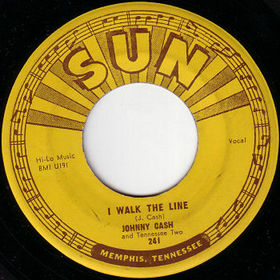
I Walk the Line
"I Walk the Line" is a song written and recorded in 1956 by Johnny Cash. After three attempts with moderate chart ratings, it became Cash's first #1 hit on the Billboard charts, eventually reaching #17 on the US pop charts.
For other uses, see I Walk the Line (disambiguation)."I Walk the Line"
The song remained on the record charts for over 43 weeks, and sold over two million copies.[3] It has also been used on many LPs released from Sun Records, such as With His Hot and Blue Guitar, Sings the Songs That Made Him Famous, and Sings Hank Williams. It was the title song for a 1970 film starring Gregory Peck and a 2005 biopic of Cash starring Joaquin Phoenix. The song captures Johnny Cash's "boom-chicka-boom" sound by Johnny putting a dollar bill in the neck of his guitar.
Background of the song[edit]
The unique chord progression for "I Walk the Line" was inspired by the backwards playback of guitar runs on Cash's tape recorder[4] while he was stationed in Germany as a member of the United States Air Force. Later in a telephone interview, Cash stated, "I wrote the song backstage one night in 1956 in Gladewater, Texas. I was newly married at the time, and I suppose I was laying out my pledge of devotion."[5] After writing the song, Cash had a discussion with fellow performer Carl Perkins, who encouraged him to adopt "I Walk the Line" as the song title. Cash originally intended the song to be a slow ballad, but producer Sam Phillips preferred a faster arrangement;[6] in the end, Cash agreed to the change, and the uptempo recording met with success.
On one occasion, while performing "I Walk the Line" on his TV show, Cash explained to the audience the reason for his humming during the song: "People ask me why I always hum whenever I sing this song. It's to get my pitch." The humming was necessary since the song required Cash to change keys several times while singing it.
The song's lyrics discuss resisting temptation, being accountable, and remaining faithful to Vivian Liberto during his first marriage.[7] However, Johnny Cash would eventually divorce Vivian Liberto and then marry June Carter. Liberto would write a book called I Walked the Line about her time with Cash.[8]
"I Walk the Line" was originally recorded at Sun Studio on April 2, 1956, and was released on May 1. It spent six weeks at the top spot on the U.S. country Juke Box charts that summer, one week on the C&W Jockey charts and number two on the C&W Best Seller charts.[9] "I Walk the Line" crossed over and reached #19 on the pop music charts.[10]
The song was performed with the help of Marshall Grant and Luther Perkins, two mechanics who were introduced to Cash by his older brother Roy after Cash was discharged from the Air Force. Cash and his wife, Vivian, were living in Memphis, Tennessee, at the time. Cash became the front man for the group and precipitated their introduction to Sam Phillips of Sun Records. In 1955, they began recording under the Sun label.
It was re-recorded four times during Cash's career: in 1964 for the I Walk the Line album, again in 1969 for the At San Quentin album (a live performance), in 1970 for the I Walk the Line soundtrack, and finally in 1988 for the Classic Cash: Hall of Fame Series album. Additional live performances have been released since Cash's death, along with a demo version recorded prior to the formal 1956 recording session that was released on Bootleg Vol. II: From Memphis to Hollywood (Columbia/Legacy) in 2011.
Legacy[edit]
The song is included in "The 500 Songs That Shaped Rock and Roll", a permanent exhibit at the Rock and Roll Hall of Fame.[12][13] In 2004, Rolling Stone magazine ranked the song at No. 30 on its list of the 500 Greatest Songs of All Time.[14] and also ranked it #1 on its list of the 100 greatest country songs of all time in June 2014.[15] In many countries like Ireland the song was recycled to reopen closed railway lines. In 1998, the 1956 recording of the song on Sun Records was inducted into the Grammy Hall of Fame.[16]
"Walk the Line Remix"
21 August 2009
2:53
Columbia
Johnny Cash
Laurent Wolf